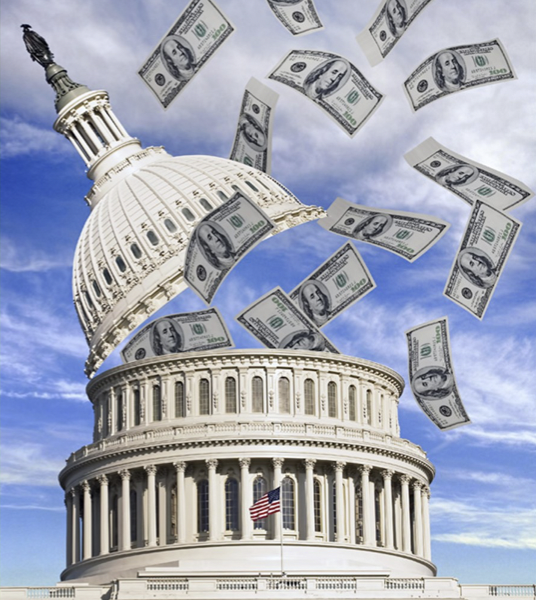
• Debt ceiling battle’s impact on Wyoming remains unclear
By Maya Shimizu Harris
Casper Star-Tribune
Via- Wyoming News Exchange
CASPER — Last month, Republicans in the House, including Wyoming’s Rep. Harriet Hageman, narrowly passed a bill that would increase the nation’s debt ceiling by $1.5 trillion. Raising the debt ceiling allows the federal government to make payments that it has already committed to. (It’s different from the 12 budget bills that Congress has to pass every year, which give the federal government authority to make new expenditures.)
Increasing this debt limit is a matter Congress takes up as needed, and in the past, lawmakers have always approved an increase so that the federal government can continue borrowing money to make payments it has already committed to.
But the bill passed in the House ties that debt limit raise with significant budget cuts for the future — something which the Biden Administration would prefer to address in separate negotiations.
The disagreement has resulted in a gridlock as the ominous “X date” — the date when the federal government would default on its debt, which it has never done before — looms closer.
The situation is more political gamesmanship than anything else.
Given what’s at stake, it’s unlikely the federal government won’t reach some kind of compromise before the nation defaults on its debt, which the U.S. Treasury Secretary Janet Yellen has warned could lead to “economic calamity.”
That being said, debt negotiations have become more heated in recent years.
Wyoming’s congressional delegation is trying to capitalize on the current gridlock to push for cuts in government spending. Hageman — the only member of the delegation who has voted on the debt ceiling bill at this point — has touted the GOP-backed bill as a way to cut federal spending.
“Today’s bill is a major step towards restoring fiscal sanity, as well as reigning in the administrative state and setting us back on the trail to energy independence,” she said in a statement following the House’s vote on the bill, highlighting that the bill would bar the executive branch from spending money without congressional approval.
Hageman noted that debt ceilings “have traditionally been used as a negotiating tool” to cut spending.
“Our current debt ceiling situation should be no different and any effort by Joe Biden to force through a so-called ‘clean debt ceiling increase’ with no spending cuts will be met with a NO vote by me,” she said.
The Senate hasn’t yet voted on a debt ceiling bill, but Lummis and Barrasso have indicated their support for a debt limit raise tied to budget cuts like the one that emerged from the House.
They were both among 43 Republicans who signed a letter to New York Democrat and Senate Majority Leader Chuck Schumer vowing to oppose raising the debt ceiling without reigning in the budget.
“No nation in the history of the world has lasted very long when their debt exceeded their GDP,” Lummis said at an outdoor press conference in Washington last week. “That is where we are. Washington needs to end the cycle of reckless spending.”
Barrasso, who also spoke at the conference, echoed that message, accusing President Biden of “playing Russian roulette with the American economy.”
“He thinks he can just continue to spend money and borrow money we don’t have.”
Barrasso said in a statement on the day the House passed the bill that “Wyoming families need a clean break from the reckless spending of the last two years.” (The debt limit was suspended altogether during the COVID-19 pandemic.)
He called the House Republicans’ bill “a serious solution” to rein in the federal budget.
Extraordinary measures
The U.S. hit its national debt ceiling in January and has been resorting to what are called “extraordinary measures”to continue paying its bills. But the federal government is running out of room to maneuver; Yellen, the U.S.TreasurySecretary, has warned that the nation could default on its debt as early as June, though that “X date” is uncertain because government revenue can be unpredictable.
That could be disastrous not only for the nation’s economy, but for markets around the globe.
“I don’t think it’s too strong to say that it would be catastrophic in financial markets,” University of Wyoming economics professor Dr. Robert Godby said, speculating that such a situation could be comparable to the 2008 economic crash but noting that at this point it’s“very uncertain how this would unfold.”
Godby compared the spending pattern of the U.S. to a household; as a household gets wealthier, it typically has higher debt loads. A wealthier family might buy a larger house and take on a larger mortgage. It might purchase a nicer car and pay for more expensive college education. All these things that a household takes on debt for as it becomes wealthier will, of course, increase its debt load.
“The question is, what does the debt load look like in proportion to your income? In proportion to your assets and your net worth?” Godby said.
The degree of willingness to meet those debt obligations is an additional concern.
“That’s where a decision to default could really cause significant costs to the U.S. economy,” Godby explained; uncertainty about the U.S.’ willingness to pay back its debt could downgrade its credit, increase interest rates and have negative rippling effects throughout the nation’s economy.
But at this early point, the conflict in Washington doesn’t appear to have touched the nation’s economy.Government services haven’t been impacted very much. And so far, markets also seem unaffected by the potential threat of a default.
That could change, though, as the “X date” draws nearer. During a similar situation in 2011, the federal government reached an agreement on raising the debt ceiling at the midnight hour as markets dropped and the nation’s credit was downgraded in anticipation of it defaulting on its debt. That cost the U.S. economy roughly $1.3 billion increased interest payments, according to the U.S. Government Accountability Office.
Wyoming impact?
It’s unclear how the battle in Washington over the debt ceiling might affect Wyoming.
Michael Pearlman, the spokesperson for Gov. Mark Gordon’s office, said in an email to the Star-Tribune that at this point Wyoming hasn’t received guidance from the U.S. Treasury about what would happen if Congress doesn’t reach an agreement by the “X date,” though he said that the state “will be prepared.”
In any case, he expressed confidence that the federal government will reach an agreement before defaulting on its debt.
“Wyoming is not unfamiliar with the impacts of gridlock in Washington DC, and we expect the federal government to live up to its financial commitments,” Pearlman said.
Unlike the nation defaulting on its debt, which is unprecedented, government shutdowns have occurred a number of times before. The federal government could choose, however, to halt federal-funded services if it were no longer able to meet its debt obligations.
In past instances of federal government shutdown, Pearlman said, the U.S.Treasury prioritized the flow of funds for Wyoming and other states.
After the U.S. Treasury distributes remaining federal funds to prioritized programs, federally funded positions could be subject to furloughs, he explained.
It’s possible, Godby said, that the federal government chooses to halt federally-funded services in anticipation of the “X date.”
Part of such a decision could be motivated by a need to conserve funds and avoid more systemic economic damage. But it could also be a negotiating tool to demonstrate the consequences of failing to reach an agreement.
Officials from several federal agencies in Wyoming told the Star-Tribune that they couldn’t “speculate on unforeseen circumstances” when asked what they would expect to happen if the federal government fails to reach an agreement by the “X date.” They didn’t provide clarity on whether or not they have already felt some impact from the standoff.




